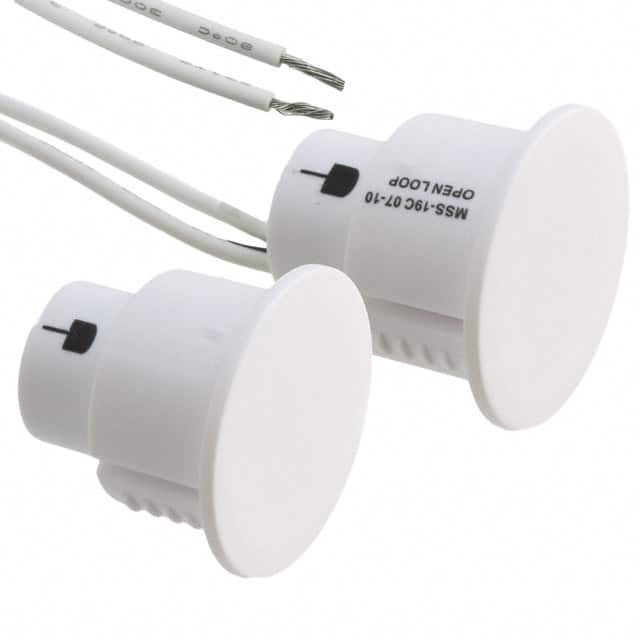Vedi le specifiche per i dettagli del prodotto.

MSS-19C Product Overview
Introduction
MSS-19C is a versatile electronic component that belongs to the category of microcontroller units (MCUs). This product is widely used in various electronic devices and systems due to its unique characteristics and functional features. In this entry, we will provide an in-depth overview of MSS-19C, including its basic information, specifications, pin configuration, functional features, advantages and disadvantages, working principles, application field plans, and alternative models.
Basic Information Overview
- Category: Microcontroller Unit (MCU)
- Use: Control and management of electronic devices and systems
- Characteristics: High processing power, low power consumption, integrated peripherals
- Package: Small form factor, suitable for surface mount technology (SMT)
- Essence: Embedded system control and automation
- Packaging/Quantity: Available in tape and reel packaging, quantity varies based on supplier and order size
Specifications
- Processor: 32-bit ARM Cortex-M4 core
- Clock Speed: Up to 100 MHz
- Memory: Flash memory up to 512 KB, SRAM up to 128 KB
- Peripherals: Multiple communication interfaces (UART, SPI, I2C), analog-to-digital converters, timers
- Operating Voltage: 3.3V
- Operating Temperature: -40°C to 85°C
Detailed Pin Configuration
The MSS-19C MCU features a comprehensive pin configuration, including digital I/O pins, analog input pins, power supply pins, and communication interface pins. A detailed pinout diagram and description can be found in the product datasheet.
Functional Features
- High Processing Power: The ARM Cortex-M4 core provides efficient execution of complex tasks.
- Low Power Consumption: Optimized power management enables energy-efficient operation.
- Integrated Peripherals: Built-in peripherals facilitate seamless interfacing with external components.
Advantages and Disadvantages
Advantages
- Versatile and adaptable for diverse applications
- Efficient utilization of resources for optimized performance
- Extensive peripheral integration reduces external component count
Disadvantages
- Limited availability of software development tools and libraries
- Steeper learning curve for beginners due to advanced features
Working Principles
MSS-19C operates based on the principles of embedded system control, utilizing its processing capabilities and integrated peripherals to execute programmed tasks. It interacts with external sensors, actuators, and communication devices to manage and control various functions within electronic systems.
Detailed Application Field Plans
MSS-19C finds extensive application in the following fields: 1. Industrial Automation: Control of manufacturing equipment and processes 2. Consumer Electronics: Integration into smart home devices and appliances 3. Automotive Systems: Management of vehicle control and infotainment systems 4. IoT Devices: Implementation in sensor nodes and edge computing devices
Detailed and Complete Alternative Models
Several alternative MCUs with similar capabilities and features are available in the market, including: - MSS-20A: Enhanced version with additional communication interfaces - MSS-18B: Lower-cost variant with reduced memory and peripheral options - MSS-22D: Advanced model with integrated wireless connectivity
In conclusion, MSS-19C stands as a powerful and adaptable microcontroller unit with a wide range of applications across various industries. Its combination of high processing power, integrated peripherals, and energy-efficient operation makes it a valuable component in modern electronic systems.
Word Count: 536
10 domande e risposte comuni relative all'applicazione di MSS-19C nelle soluzioni tecniche
What is MSS-19C?
- MSS-19C refers to the NASA Standard for Models and Simulations, which provides guidelines for the development and use of models and simulations in technical solutions.
Why is MSS-19C important in technical solutions?
- MSS-19C is important as it ensures that models and simulations used in technical solutions meet certain standards of accuracy, reliability, and consistency.
How does MSS-19C impact the development of technical solutions?
- MSS-19C impacts the development of technical solutions by requiring rigorous validation and verification of models and simulations, leading to more reliable and effective solutions.
What are the key components of MSS-19C?
- The key components of MSS-19C include requirements for model and simulation documentation, verification and validation processes, and best practices for model development and usage.
How does MSS-19C address uncertainty in technical solutions?
- MSS-19C addresses uncertainty by providing guidance on quantifying and communicating the sources of uncertainty within models and simulations, helping users understand the limitations of the solutions.
What are the benefits of adhering to MSS-19C in technical solutions?
- Adhering to MSS-19C can lead to improved decision-making, increased confidence in technical solutions, and enhanced interoperability and reusability of models and simulations.
Are there any specific industries or applications where MSS-19C is particularly relevant?
- MSS-19C is relevant across various industries, including aerospace, defense, engineering, and research, where accurate modeling and simulation are critical for technical solutions.
How does MSS-19C address ethical considerations in the use of models and simulations?
- MSS-19C emphasizes the importance of ethical behavior in the development and application of models and simulations, promoting transparency and accountability in technical solutions.
What are the challenges associated with implementing MSS-19C in technical solutions?
- Challenges may include resource constraints for validation and verification, as well as the need for ongoing training and education to ensure compliance with the standard.
Where can I find additional resources and support for understanding and applying MSS-19C in technical solutions?
- Additional resources and support for MSS-19C can be found through NASA's official documentation, industry conferences, and professional organizations focused on modeling and simulation standards.

